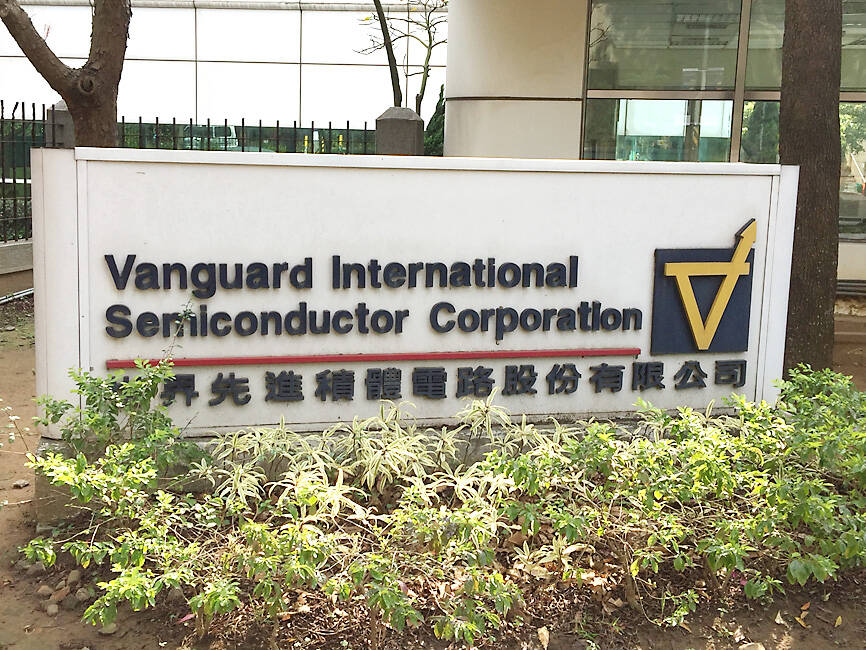Vanguard International Semiconductor Corp (世界先進) yesterday slightly trimmed capital expenditures for this year to less than NT$10 billion (US$317.3 million), as customers became more conservative about inventory buildup due to sagging end product demand.
Vanguard, which makes power management chips and driver ICs used in flat panel displays, three months ago said it planned to spend NT$10 billion on new facilities and manufacturing equipment.
About 60 percent of it was earmarked for capacity expansion at its Singapore plant, which has eight-inch fabrication capabilities.

Photo: Grace Hung, Taipei Times
“To cope with the drastic inventory correction cycle faced by the semiconductor industry as well as macroeconomic uncertainties including inflation, interest-rate hikes, wars and geopolitical tensions, the company will cautiously evaluate its capacity expansion,” company president John Wei (尉濟時) told an online investors’ conference yesterday.
However, the chipmaker reiterated that its planned capacity expansion for this year was unchanged at an annual growth rate of 6 percent to 7 percent, after a downward revision in May from an estimate of 8 percent annual growth.
The Singapore fab contributes 15 percent to the company’s total capacity.
“Looking into the third quarter, as sluggish end-market demand led to a slow pace of supply chain inventory digestion, customers are taking a conservative approach to wafer ordering and inventory buildup in the second half of this year,” Wei said.
As a result, Vanguard said it expects wafer shipments this quarter to grow 4 percent to 6 percent quarter-on-quarter, after a significant rebound of about 24 percent last quarter.
Factory utilization is to be flat at 60 percent this quarter, compared with last quarter, Wei said.
Gross margin would slide to between 25 percent and 27 percent during the current quarter, the lowest levels in about eight years, from 30 percent during the three-month period to June. Vanguard attributed the reduction to heavy depreciation costs and higher utilities costs.
Vanguard expects gross margin to rebound to about 30 percent or 40 percent after factory utilization swings back to higher levels, when the semiconductor inventory correction cycle ends and the global economy recovers, company chairman Fang Leuh (方略) said.
The chipmaker said it has short order visibility of about three months.
Vanguard’s power management chip customers are expected to face severe inventory corrections in the third quarter and possibly into the fourth quarter, it said.
Power management chips made up 63 percent of the company’s total revenue last quarter.
Average selling prices are to hold steady this quarter on a sequential basis, as a better product mix helps offset lower prices from wafers Vanguard prebuilt for customers in the first quarter and in the final quarter last year.
Net profit expanded to NT$1.994 billion during the quarter ending on June 30, compared with NT$1.36 billion in the first quarter. That represented a dip of about 59 percent from NT$4.89 billion in the second quarter of last year.
Earnings per share rose to NT$1.21 last quarter, from NT$0.82 in the previous quarter. On an annual basis, earnings per share were down from NT$2.94.

Shiina Ito has had fewer Chinese customers at her Tokyo jewelry shop since Beijing issued a travel warning in the wake of a diplomatic spat, but she said she was not concerned. A souring of Tokyo-Beijing relations this month, following remarks by Japanese Prime Minister Sanae Takaichi about Taiwan, has fueled concerns about the impact on the ritzy boutiques, noodle joints and hotels where holidaymakers spend their cash. However, businesses in Tokyo largely shrugged off any anxiety. “Since there are fewer Chinese customers, it’s become a bit easier for Japanese shoppers to visit, so our sales haven’t really dropped,” Ito

The number of Taiwanese working in the US rose to a record high of 137,000 last year, driven largely by Taiwan Semiconductor Manufacturing Co’s (TSMC, 台積電) rapid overseas expansion, according to government data released yesterday. A total of 666,000 Taiwanese nationals were employed abroad last year, an increase of 45,000 from 2023 and the highest level since the COVID-19 pandemic, data from the Directorate-General of Budget, Accounting and Statistics (DGBAS) showed. Overseas employment had steadily increased between 2009 and 2019, peaking at 739,000, before plunging to 319,000 in 2021 amid US-China trade tensions, global supply chain shifts, reshoring by Taiwanese companies and

Taiwan Semiconductor Manufacturing Co (TSMC) Chairman C.C. Wei (魏哲家) and the company’s former chairman, Mark Liu (劉德音), both received the Robert N. Noyce Award -- the semiconductor industry’s highest honor -- in San Jose, California, on Thursday (local time). Speaking at the award event, Liu, who retired last year, expressed gratitude to his wife, his dissertation advisor at the University of California, Berkeley, his supervisors at AT&T Bell Laboratories -- where he worked on optical fiber communication systems before joining TSMC, TSMC partners, and industry colleagues. Liu said that working alongside TSMC

TECHNOLOGY DAY: The Taiwanese firm is also setting up a joint venture with Alphabet Inc on robots and plans to establish a firm in Japan to produce Model A EVs Manufacturing giant Hon Hai Precision Industry Co (鴻海精密) yesterday announced a collaboration with ChatGPT developer OpenAI to build next-generation artificial intelligence (AI) infrastructure and strengthen its local supply chain in the US to accelerate the deployment of advanced AI systems. Building such an infrastructure in the US is crucial for strengthening local supply chains and supporting the US in maintaining its leading position in the AI domain, Hon Hai said in a statement. Through the collaboration, OpenAI would share its insights into emerging hardware needs in the AI industry with Hon Hai to support the company’s design and development work, as well